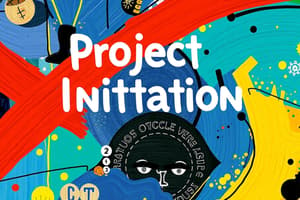Podcast
Questions and Answers
Which approach is most effective in enhancing student engagement during lessons?
Which approach is most effective in enhancing student engagement during lessons?
- Using solo assignments only
- Incorporating group activities (correct)
- Lecturing without interaction
- Reading from a textbook
What is the primary benefit of providing timely feedback to students?
What is the primary benefit of providing timely feedback to students?
- It fosters a sense of community
- It has no significant effect on learning
- It increases their test scores only
- It promotes better understanding of concepts (correct)
Which element is crucial for developing critical thinking skills in students?
Which element is crucial for developing critical thinking skills in students?
- Encouraging open-ended questions (correct)
- Providing answers immediately
- Standardized testing
- Focusing solely on memorization
How do collaborative projects benefit students' learning experience?
How do collaborative projects benefit students' learning experience?
What role does self-assessment play in student learning?
What role does self-assessment play in student learning?
Flashcards
String
String
A sequence of characters, typically enclosed in quotes.
Scalar
Scalar
A data type that can hold a single value, such as a number, text, or Boolean.
Array
Array
A data structure that allows you to store a collection of items, typically in a specific order.
Dictionary/Hashmap
Dictionary/Hashmap
Signup and view all the flashcards
Tree
Tree
Signup and view all the flashcards
Study Notes
PMP Exam Prep Cheat Sheet - 2024
- This document is a 2024 PMP exam prep cheat sheet.
- The last update was in December 2024.
- Revisions are noted on the last page of the document.
- Uploading, copying, editing, or sharing this document without permission is prohibited.
- Access is valid for 6 months from the date of purchase.
- The document details PMP/Scrum Master concepts, characteristics, do's and don'ts, guiding principles, mindset section, how to tackle questions, keywords, steps to take, and the difference between risks and issues.
Mindset
- The mindset section is crucial for exam preparation.
- It provides key decision-making strategies for Project Managers/Scrum Masters.
- It contains personal notes, user tips, and video information.
- Leading principles are proactive servant leadership and good stewardship.
Guiding Principles
- Do's: Adhere to procedures, prioritize team needs, focus on project/customer success, and involve stakeholders actively.
- Don'ts: Don't bypass steps, processes, or documentation.
How to Tackle Questions
- Rely on provided information, avoid assumptions.
- Follow the sequence: Assess, Review, and Take Action (A.R.T).
Keywords and Steps
- Keywords are identified within the questions.
- Proactive planning, effective communication, risk management, and ethics are emphasized in the step-by-step guidelines.
Risk vs Issue
- Risk: Uncertain events that could potentially occur in the future. Keywords often include may/might/could. Actions include implementing risk responses or risk register updates.
- Issue: Problems that have started occurring. Keywords in questions often include will/should/has. Actions include fixing the issue or escalating to a stakeholder.
Traditional vs Agile
- Predictive (Waterfall): Traditional project approach focuses on planning upfront. Work is sequential. Scope is relatively stable.
- Agile: Iterative and incremental approach, with continuous feedback and scope adaptation.
Project Management Plan vs Charter
- The project charter is a high-level authority document that initiates a project; it identifies project objectives, scope, and responsibilities.
- The project management plan provides a detailed roadmap for project execution and management, including scope, schedule, cost, quality, resources, communications, and risk management procedures.
PMI Process Groups
- Initiation
- Planning
- Execution
- Monitoring and Controlling
- Closing
Other Topics
- Managing virtual teams
- Resolving conflicts
- Project closure
- Team and individual performance
- Communication management
- Importance of the stakeholder register
- Contract types: Firm fixed price (FFP), fixed price incentive fee (FPIF), fixed price with economic price adjustments (FPEPA)
- Cost-reimbursable contracts: Cost plus fixed fee (CPFF), Cost plus incentive fee (CPIF), Cost plus award fee (CPAF)
- Time and materials (T&M)
- Project Business Case vs Benefits Management Plan
- Issue log, Change log, and Assumption log
- Differences between predictive and agile project types
- Role and responsibilities of project sponsor, manager, and functional manager
Data Representation Techniques
- Control charts, flowcharts, cause-and-effect diagrams, affinity diagrams, histograms, matrix diagrams, and scatter diagrams for quality control and evaluation of deliverables.
Estimating Tools and Techniques
- Expert judgment, bottom-up estimating, analogous estimating, and parametric estimating using historical data to identify project completion times.
Scheduling Techniques
- Rolling wave planning and adaptive planning
- Lead and lag
- Resource leveling and smoothing
Risk Management
- Identifying, assessing, mitigating, accepting, and transferring risks.
Opportunities
- Exploiting, enhancing, accepting, sharing, and escalating opportunities
Studying That Suits You
Use AI to generate personalized quizzes and flashcards to suit your learning preferences.




